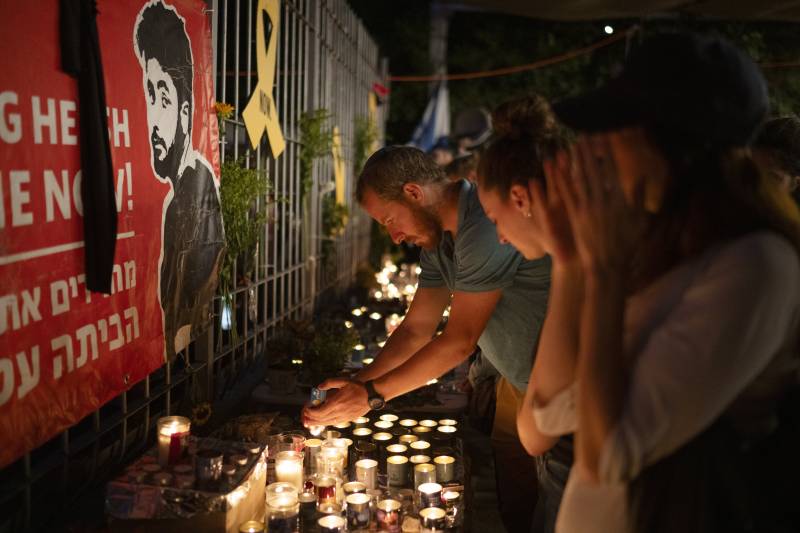“We really think that the government is making these decisions for its own conservation and not for the lives of the hostages, and we need to tell them, ‘Stop!’” said Shlomit Hacohen, a Tel Aviv resident.
Three of the six hostages found dead — including an Israeli-American — were reportedly scheduled to be released in the first phase of a cease-fire proposal discussed in July, and this only added to the sense of fury and frustration among the protesters.
“Nothing is worse than knowing that they could have been saved,” said Dana Loutaly. “Sometimes it takes something so awful to shake people up and get them out into the streets.”
The military said all six hostages were killed shortly before Israeli forces arrived. “Whoever murders hostages doesn’t want a deal,” Netanyahu said, blaming the Hamas militant group for the stalled negotiations.
One hostage was Israeli-American Hersh Goldberg-Polin, 23, a native of Berkeley, who lost part of his left arm to a grenade in the attack. In April, a Hamas-issued video showed him alive, sparking new protests in Israel.
The army identified the others as Ori Danino, 25; Eden Yerushalmi, 24; Almog Sarusi, 27; Alexander Lobanov, 33; and Carmel Gat, 40.
The Israeli Health Ministry said autopsies had determined the hostages were shot at close range and died on Thursday or Friday. The army said the bodies were recovered from a tunnel in the southern Gaza city of Rafah, around a kilometer (half a mile) from where another hostage was rescued alive last week.
Lt. Col. Nadav Shoshani, a military spokesperson, said Israeli forces found the bodies several dozen meters (yards) underground as “ongoing combat” was underway, but that there was no firefight in the tunnel itself. He said there was no doubt Hamas had killed them.
Hamas has offered to release the hostages in return for an end to the war, the withdrawal of Israeli forces from Gaza and the release of a large number of Palestinian prisoners, including high-profile militants.
Izzat al-Rishq, a senior Hamas official, said the hostages would still be alive if Israel had accepted a U.S.-backed cease-fire proposal that Hamas said it had agreed to in July.
Funerals began, with more outrage. Sarusi’s body was wrapped in an Israeli flag. “You were abandoned on and on, daily, hour after hour, 331 days,” his mother, Nira, said. “You and so many beautiful and pure souls.”
Divisions in Israel, and in the government
Netanyahu has vowed to continue the fighting until Hamas is destroyed.
Top security officials say the intense pressure on Hamas has created favorable conditions for a cease-fire deal. The army, noting the difficulty of rescue operations, has acknowledged that a deal is the only way to bring home large numbers of hostages safely.
But critics have accused the prime minister of putting his personal interests over those of the hostages. The war’s end likely will lead to an investigation into his government’s failures in the Oct. 7 attacks, the government’s collapse and early elections.
Some analysts said the public outcry over the six hostages who died could signal a new level of political pressure on Netanyahu.
“I think this is an earthquake. This isn’t just one more step in the war,” said Nomi Bar-Yaacov, associate fellow in the International Security Program at Chatham House, shortly before Sunday’s protests.
Divisions also have been exposed within the government. Senior military and security officials, including Defense Minister Yoav Gallant, have warned that time is running out.
Israel’s Channel 12 reported that Netanyahu got into a shouting match at a security Cabinet meeting Thursday with Gallant, who accused him of prioritizing control of a strategic corridor along the Gaza-Egypt border — a major sticking point in the talks — over the lives of the hostages.
An Israeli official confirmed the report and said three of the hostages — Goldberg-Polin, Yerushalmi and Gat — had been slated to be released in the first phase of a cease-fire proposal discussed in July. The official was not authorized to brief media about the negotiations and spoke on condition of anonymity.
“In the name of the state of Israel, I hold their families close to my heart and ask forgiveness,” Gallant said Sunday. The Cabinet was meeting Sunday night.
A forum of hostage families has demanded a “complete halt of the country” to push for a cease-fire and hostage release.
Even a mass outpouring of anger would not immediately threaten Netanyahu or his far right government. He still controls a majority in parliament. But he has caved in to public pressure before. A general strike last year helped lead to a delay in his controversial judicial overhaul.
A family’s high-profile campaign
Goldberg-Polin’s parents, U.S.-born immigrants to Israel, became perhaps the most high-profile relatives of hostages on the international stage. They met with U.S. President Joe Biden and Pope Francis and on Aug. 21, they addressed the Democratic National Convention — after sustained applause and chants of “bring him home.”

